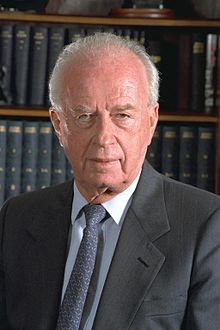
 Following Golda Meir’s resignation in April 1974, Yitzhak Rabin was elected party leader, after he defeated Shimon Peres. The rivalry between these two labour leaders remained fierce and they competed several times in the next two decades for the leadership role. Rabin succeeded Golda Meir as Prime Minister of Israel on 3 June 1974. This was a coalition government, including Ratz, the Independent Liberals, Progress and Development and the Arab List for Bedouins and Villagers. This arrangement, with a bare parliamentary majority, held for a few months and was one of the few periods in Israel’s history where the religious parties were not part of the coalition. The National Religious Party joined the coalition on 30 October 1974 and Ratz left on 6 November.
Following Golda Meir’s resignation in April 1974, Yitzhak Rabin was elected party leader, after he defeated Shimon Peres. The rivalry between these two labour leaders remained fierce and they competed several times in the next two decades for the leadership role. Rabin succeeded Golda Meir as Prime Minister of Israel on 3 June 1974. This was a coalition government, including Ratz, the Independent Liberals, Progress and Development and the Arab List for Bedouins and Villagers. This arrangement, with a bare parliamentary majority, held for a few months and was one of the few periods in Israel’s history where the religious parties were not part of the coalition. The National Religious Party joined the coalition on 30 October 1974 and Ratz left on 6 November.
In foreign policy, the major development at the beginning of Rabin’s term was the Sinai Interim Agreement between Israel and Egypt, signed on 1 September 1975. Both countries declared that the conflict between them and in the Middle East shall not be resolved by military force but by peaceful means. This agreement followed Henry Kissinger’s shuttle diplomacy and a threatened ‘reassessment’ of the United States’ regional policy and its relations with Israel. Rabin notes it was, “an innocent-sounding term that heralded one of the worst periods in American-Israeli relations”. The agreement was an important step towards the Camp David Accords of 1978 and the peace treaty with Egypt signed in 1979.
Operation Entebbe was perhaps the most dramatic event during Rabin’s first term of office. On his orders, the IDF performed a long-range undercover raid to rescue passengers of an airliner hijacked by militants belonging to the Popular Front for the Liberation of Palestine’s Wadie Haddad faction and the German Revolutionary Cells (RZ), and had been brought to Idi Amin’s Uganda. The operation was generally considered a tremendous success, and its spectacular character has made it the subject of much continued comment and study.
Towards the end of 1976 his coalition government with the religious parties suffered a crisis: A motion of no confidence had been brought by Agudat Yisrael over a breach of the Sabbath on an Israeli Air Force base when four F-15 jets were delivered from the US and the National Religious Party had abstained. Rabin dissolved his government and decided on new elections, which were to be held in May 1977.
Following the March 1977 meeting between Rabin and U.S. President Jimmy Carter, Rabin publicly announced that the U.S. supported the Israeli idea of defensible borders; Carter then issued a clarification. A “fallout” in U.S./Israeli relations ensued. It is thought that the fallout contributed to the Israeli Labour Party’s defeat in the May 1977 elections. On March 15, 1977, Haaretz journalist Dan Margalit revealed that a joint dollar account in the names of Yitzhak and Leah Rabin, opened in a Washington, D.C., bank during Rabin’s term of office as Israel ambassador (1968-73), was still open, in breach of Israeli law. According to Israeli currency regulations at the time, it was illegal for citizens to maintain foreign bank accounts without prior authorisation. Rabin resigned on April 8, 1977, following the revelation by Maariv journalist Shraga Mekel that the Rabins held two accounts in Washington, not one, containing $10,000, and that a Finance Ministry administrative penalty committee fined them IL150,000. Rabin withdrew from the party leadership and candidacy for prime minister, an act that earned him praise as a man of integrity.
On the evening of 4 November 1995 (12th of Heshvan on the Hebrew Calendar), Rabin was assassinated by Yigal Amir, a radical right-wing Orthodox Jew who opposed the signing of the Oslo Accords. Rabin had been attending a mass rally at the Kings of Israel Square (now Rabin Square) in Tel Aviv, held in support of the Oslo Accords. When the rally ended, Rabin walked down the city hall steps towards the open door of his car, at which point Amir fired three shots at Rabin with a semi-automatic pistol. Two shots hit Rabin, and the third lightly injured Yoram Rubin, one of Rabin’s bodyguards. Rabin was rushed to nearby Ichilov Hospital, where he died on the operating table less than 40 minutes later due to blood loss and a punctured lung. Amir was immediately seized by Rabin’s bodyguards. He was later tried, found guilty, and sentenced to life imprisonment. [Source: Wikipedia]
